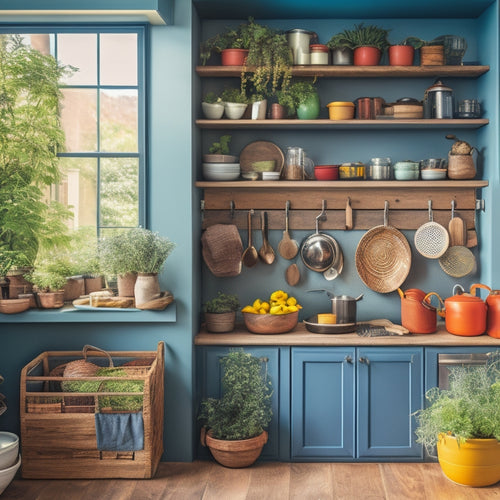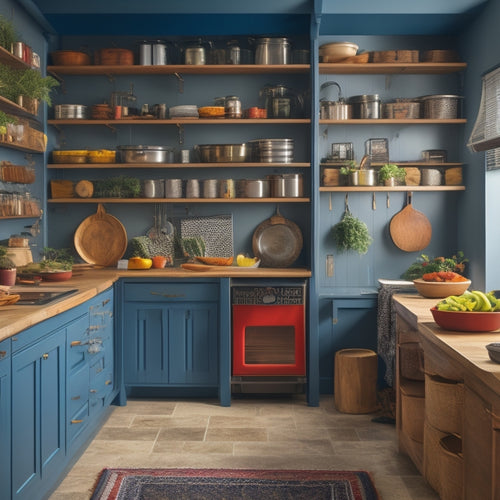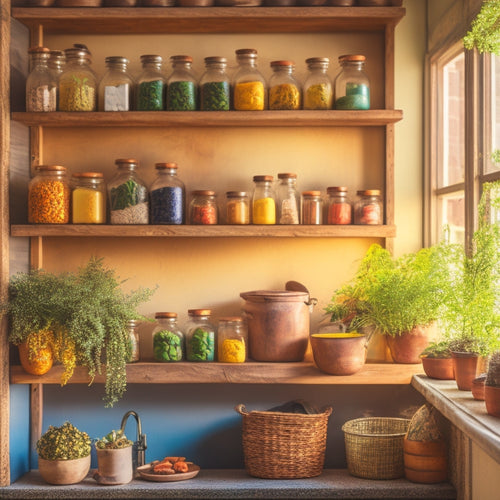
What's Holding You Back From a Clutter-Free Kitchen?
Share
You're likely no stranger to the frustration of wanting a clutter-free kitchen, but it's the common roadblocks like feeling overwhelmed, lack of accountability, and inadequate storage solutions that consistently hold you back from achieving it. You might be struggling to sort through the clutter, feeling paralyzed by the sheer amount of stuff. Or, you may lack a system to keep you on track, making it hard to maintain your space. Perhaps limited storage or a poor kitchen layout design is hindering your efforts. Whatever the reason, know that you're not alone, and there are solutions waiting to be uncovered.
Key Takeaways
• Feeling overwhelmed by kitchen clutter is a major obstacle, but breaking it down into smaller tasks and categorizing items can help.
• Lack of accountability can hinder progress, so enlist a decluttering buddy and schedule regular sessions to stay on track.
• Limited storage space can be addressed with creative organization strategies, such as wall-mounted shelves and stackable containers.
• Unhealthy emotional attachment to items can prevent decluttering, but confronting sentimental issues and letting go of unnecessary items is essential.
• Poor kitchen layout design can impede workflow, so optimizing the layout and allocating specific zones for activities can improve the cooking experience.
Feeling Overwhelmed by Kitchen Clutter
As you stand in your kitchen, surrounded by countertops cluttered with appliances, utensils, and snacks, you feel overwhelmed by the sheer amount of stuff competing for your attention. It's no wonder you're stressed out - clutter can be paralyzing!
To regain control, start with a few simple organizing tips. Clear off one countertop at a time, sorting items into categories like 'keep,' 'donate,' and 'recycle.' This will help you see what you really need and what's just taking up space.
Next, designate a home for each item, ensuring everything has its own place. This will make it easier to maintain your newly organized space and reduce stress in the long run.
Remember, a clutter-free kitchen isn't only visually appealing, but it can also improve your mental well-being. By implementing these stress management strategies, you'll be able to focus on what really matters - serving others and enjoying quality time with loved ones.
Take it one step at a time, and you'll be on your way to a peaceful, productive kitchen in no time!
Lack of Decluttering Accountability
You're more likely to stick to your decluttering goals if you establish a system of accountability, whether that's enlisting a friend to check in on your progress or scheduling regular decluttering sessions into your calendar. Having an accountability partner or decluttering buddy can provide an added motivation to stay on track.
Set a check-in schedule to review your daily progress and make adjustments as needed. This can be as simple as a weekly phone call or a daily text to share your accomplishments. By doing so, you'll be more likely to stay committed to your goals and celebrate your successes.
Additionally, having someone to report to can help you stay focused and avoid procrastination. Don't be too proud to ask for help or encouragement. Share your decluttering goals with a friend or family member and ask them to hold you accountable.
With a system of accountability in place, you'll be more likely to achieve a clutter-free kitchen and maintain it over time.
Limited Space for Storage
Limited space for storage is a common challenge in many kitchens, forcing you to get creative with the space you have. Don't let this limitation hold you back from achieving a clutter-free kitchen. Instead, focus on implementing creative organization strategies that maximize your storage capacity.
Consider investing in space-saving solutions like wall-mounted shelves, hooks, or baskets that keep frequently used items within easy reach.
Install a pegboard on a kitchen wall or the back of a cabinet door to hang utensils, pots, and pans, freeing up cabinet space for less frequently used items. Utilize the often-wasted space above your kitchen cabinets by adding decorative storage bins or baskets to store infrequently used items.
Make the most of your kitchen's vertical space by using stackable containers or shelves to store items like cookbooks, spices, or cleaning supplies. By thinking outside the box and finding innovative storage solutions, you can create a more organized, clutter-free kitchen that serves you and your loved ones well.
Poor Kitchen Layout Design
Optimize your kitchen's workflow by reassessing the layout, as a poorly designed space can lead to clutter and inefficiency, even with ample storage solutions in place. A well-planned layout can make a significant difference in your kitchen's functionality.
Take a step back and evaluate how you move around your kitchen. Do you find yourself constantly walking between the sink, stove, and refrigerator? This inefficient workflow can lead to wasted space and time.
Consider the 'work triangle' concept, where these three essential stations are positioned to minimize walking distances and maximize efficiency. Additionally, think about the 'zones' in your kitchen, such as a prep area, cooking zone, and cleaning station. By allocating specific spaces for each activity, you can reduce clutter and improve your overall cooking experience.
Unhealthy Emotional Attachment
Take a hard look at your kitchen belongings and ask yourself if you're holding onto items out of sentimental value rather than practical necessity. Are you guilty of emotional hoarding, clinging to possessions that no longer serve a purpose? It's time to confront those attachment issues and let go of the oversentimental clutter that's taking over your kitchen.
Be honest with yourself: do you really need that broken appliance or the set of dishes your grandmother gave you? Or are you holding onto them because of the memories attached? It's okay to acknowledge the emotions, but it's not okay to let them control your kitchen space.
Remember, your kitchen is meant to be a functional area where you can serve others, not a storage unit for sentimental trinkets.
Start by sorting items into categories: keep, donate, and discard. Be ruthless – if you haven't used it in the past year, it's probably safe to let it go.
Inadequate Storage Solutions
You're likely guilty of overcrowding your kitchen with clutter simply because you lack a system for storing items efficiently. Without a proper storage plan, it's crucial to let clutter build up, making meal prep and cooking a stressful experience. To combat this, it's vital to assess your kitchen's storage needs and create a tailored solution.
Consider investing in custom shelving to maximize your kitchen's vertical space. This will help keep frequently used items within easy reach while keeping less-used items tucked away.
Don't forget about your drawers! Drawer organizers can work wonders in keeping utensils, cookware, and dinnerware tidy and organized. By assigning a designated spot for each item, you'll be able to find what you need quickly and effortlessly.
No Clear Decluttering Plan
Without a clear decluttering plan, kitchen clutter tends to build up over time, making it difficult to maintain a sense of organization and control. You might find yourself constantly battling to keep your kitchen tidy, but without a plan, you'll likely fall back into old habits.
Procrastination tendencies can take over, and before you know it, clutter starts to accumulate again.
To overcome this, you need to create a decluttering schedule that works for you. Start by setting specific goals, like dedicating 30 minutes each day or one hour on the weekend to decluttering. Use organizational tools like a planner or app to stay on track and hold yourself accountable.
Time management is key to sticking to your plan, so prioritize your tasks and focus on one area at a time.
Physical Limitations and Injuries
As physical limitations or injuries can impede your ability to declutter and organize your kitchen, it's important to acknowledge and work around these challenges to achieve your clutter-free goals.
You might be dealing with chronic pain, mobility issues, or recent injuries that make it difficult to lift, bend, or stand for long periods. Don't let these limitations hold you back!
Here are some strategies to help you overcome them:
-
Invest in ergonomic kitchen tools: Look for tools with comfortable grips, adjustable handles, and lightweight designs that make it easier to cook and clean.
-
Create modified storage: Rearrange your storage spaces to reduce bending, reaching, or straining. Consider installing pull-out shelves, lazy susans, or adjustable cabinet organizers.
-
Prioritize accessible organization: Designate specific areas for frequently used items, keeping them within easy reach to minimize strain and effort.
Fear of Decision Fatigue
Decluttering your kitchen can be overwhelming, especially when decision fatigue sets in, making it difficult to choose what to keep, what to donate, and what to discard.
You're not alone in this struggle. Decision fatigue is a common obstacle that can hold you back from achieving a clutter-free kitchen.
The good news is that there are decluttering strategies and decision making tips that can help.
Start by breaking down your decluttering task into smaller, manageable chunks. Focus on one area at a time, like your kitchen countertops or a single cabinet. This will help you make decisions more efficiently and reduce feelings of overwhelm.
Create a simple system for categorizing items into 'keep,' 'donate,' and 'discard' piles. This will help you make quick decisions and stay focused on your goal.
Unrealistic Expectations and Goals
Set unrealistically high standards for your kitchen's organization, and you'll likely end up feeling frustrated and disappointed. You imagine a Pinterest-perfect kitchen, where every utensil has its designated spot, and every surface is spotless. But, let's be real, that's not sustainable for most of us.
To avoid this trap, try setting realistic goals and expectations for your kitchen organization project. Here are three tips to get you started:
-
Set boundaries: Identify the areas of your kitchen that need the most attention and focus on those first. Don't try to tackle everything at once.
-
Find balance: Remember that your kitchen is a functional space, not a showroom. It's okay if it's not perfect; it's about finding a balance between organization and usability.
-
Manage your time: Break down your organization project into smaller, manageable tasks that you can complete in short sessions. This will help you stay on track and avoid burnout.
Frequently Asked Questions
How Do I Declutter Sentimental Kitchen Items From Deceased Family Members?
You're struggling to declutter sentimental kitchen items from deceased family members due to emotional attachments. Start the decluttering process by acknowledging your feelings, then consider storage solutions for select sentimental items that bring joy, and let go of the rest.
Can a Clutter-Free Kitchen Be Maintained With Young Children at Home?
Imagine ancient Greeks sipping wine in your clutter-free kitchen! You can maintain it with young children by implementing child-friendly organization systems and quick decluttering tips, like daily 10-minute tidy sessions, making it a fun, family affair.
Are There Any Eco-Friendly Alternatives to Traditional Storage Solutions?
You're looking for eco-friendly alternatives to traditional storage solutions! Explore sustainable storage options like bamboo shelves, woven baskets, and repurposed containers for a green organization that's both stylish and environmentally conscious.
How Often Should I Declutter My Kitchen to Maintain Organization?
You set the pace: declutter weekly to maintain momentum, monthly to tackle hotspots, and seasonally to refresh your kitchen's organization. By doing so, you'll enjoy reduced stress, increased productivity, and a sense of accomplishment.
Can a Professional Organizer Help With Kitchen Decluttering and Design?
You can definitely benefit from a professional organizer's expertise in kitchen decluttering and design. They offer virtual organizing and remote consultations, providing customized storage and personalized solutions tailored to your needs and style.
Related Posts
-

Over-The-Door Kitchen Rack Installation Tips
To install an over-the-door kitchen rack effectively, start by measuring your door's clearance to guarantee a proper ...
-

Over-The-Door Kitchen Storage for Large Families
Over-the-door kitchen storage is a transformative solution for large families. It maximizes vertical space, keeping y...
-

Wall Racks for Storing Kitchen Herbs and Spices
Wall racks for storing kitchen herbs and spices are a revolutionary advancement for maximizing your kitchen space. Th...


